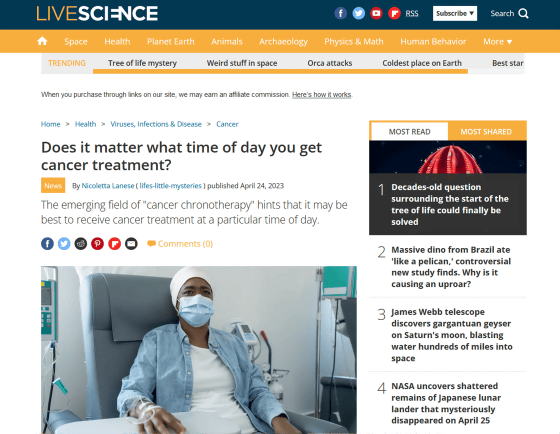There may be an 'optimal time zone' for cancer treatment

Various activities in the human body, including blood pressure, hormone production, immune cell activity, and energy metabolism, are affected by the
Does it matter what time of day you get cancer treatment? | Live Science
https://www.livescience.com/health/cancer/does-it-matter-what-time-of-day-you-get-cancer-treatment

Recent studies have shown that cancer cells have a circadian rhythm with a 24-hour cycle. A 2022 study that analyzed blood samples from cancer patients found that the amount of circulating cancer cells (CTCs) released from cancer tissue and circulating in the blood was significantly higher than in the 10 am sample. About four times as many were reported in the 4 am sample.
Cancer cell activity has a 24-hour rhythm. What is the time zone when cancer cells are active? -GIGAZINE

The fact that the human body with cancer has a 24-hour circadian rhythm, and that cancer cells, which are the target of treatment, also have a circadian rhythm, suggests that circadian rhythms can be used in the diagnosis and treatment of cancer. suggest the possibility of being closely related. “Honestly, I think circadian rhythm-based cancer treatments have a lot of potential,” Lamia said, but the real impact of the timing of drug administration is less well understood. I have pointed out that it is not.
Lamia's research team is studying the effects of circadian rhythms on disease development and treatment. A previous study showed that the rate at which metformin , a drug for treating type 2 diabetes, is metabolized in the liver is significantly altered by the circadian rhythm of mice. Another study also found that the on/off switching of genes involved in drug metabolism is influenced by circadian rhythms, and that the effects of drugs differ depending on the timing of administration.
In the field of cancer, we are conducting observational studies to find out why circadian rhythm disturbances, such as seen in night shift workers, are associated with an increased risk of cancer. Lamia's research team believes that the speed at which cells detect and repair DNA damage is regulated by circadian rhythms, and that disruption of this function may increase the risk of developing cancer. It is said that there is.
Recent studies have provided increasing evidence that circadian rhythm disruption increases cancer risk, with a March 2023 review suggesting that circadian rhythm effects may vary by cancer type. . According to this review, the times when cancers tend to metastasize vary by cancer type, with breast cancer more likely to spread while the patient is asleep, while prostate cancer and multiple myeloma It seems that the peak of metastasis will be reached in the middle of the day.

Studies on the effects of the time of day for cancer treatment have been underway since the 1980s. There are research results that the treatment schedule of injecting another chemotherapy drug has benefits in terms of side effects and survival. Research results have reported that side effects and survival time have improved depending on the time of treatment schedule for patients with ovarian cancer, acute lymphoblastic leukemia, and glioblastoma, a type of brain tumor.
In addition to treatment with anticancer drugs, circadian rhythms may be useful in
These findings suggest that circadian rhythms may play an important role in cancer treatment. However, not all studies support time-based cancer treatment, and time-based treatment schedules have beneficial effects in the treatment of colorectal and ovarian cancers. There is also a study result that it was not.

Although there is an increasing number of studies suggesting the importance of circadian rhythms in cancer treatment, more large-scale clinical studies are needed to convince cancer chemotherapy experts. In addition, since the response due to circadian rhythm may be influenced by the patient's gender, it seems necessary to investigate the effect of gender on the optimal time of cancer treatment.
Lamia pointed out that research into cancer treatment and circadian rhythms is still in its early stages, and that the impact of time of administration on the efficacy of various anticancer drugs is not fully understood. 'I think the potential impact in this area is huge, but it's a very complex issue, and it will take a lot of work to really make a difference,' he said.
Related Posts:
in Science, Posted by log1h_ik






